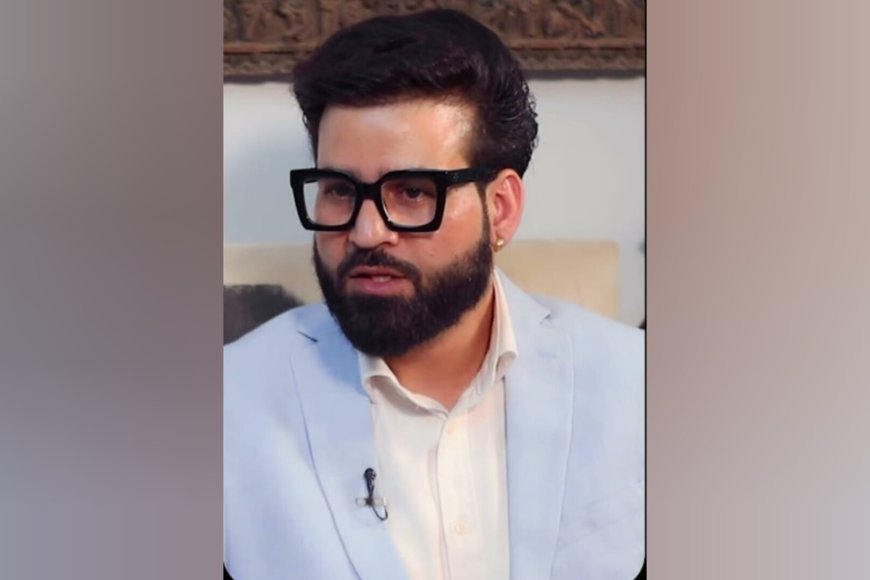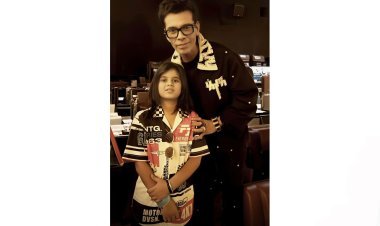Alchemy of Love -The Story of Healing Hearts and Unbreakable Bonds by Author Anubha Gujral

When life pushes you to your limits, sometimes the only way out is through words—and for author Anubha Gujral, those words became Alchemy of Love. In this deeply intimate and evocative novel, Anubha invites readers into a world where love is not about fairy tales, but about healing, truth, and unshakable bonds.
We caught up with the writer behind this soul-stirring story to talk about the inspiration that sparked Mihika and Neil’s journey, her writing rituals, and how crafting this book helped her rediscover herself during one of the toughest phases of her life. From real-world inspirations to intuitive storytelling and emotional authenticity, Anubha shares the heart and soul behind Alchemy of Love—a story born from persistence, passion, and the quiet magic of everyday resilience.
Join us as we explore the mind of a storyteller who isn’t afraid to blur the lines between fiction and reality, offering a narrative that’s as immersive as it is meaningful.
- What inspired you to write this particular book, and how did the idea for the story come to you?
When writing this book, I was going through one of the most challenging periods of my life—both that drained me emotionally and physically. Writing became my anchor, a space where I could channel everything I was experiencing into a story of love, resilience, and healing. In a way, this book wasn’t just about Mihika and Neil finding their way to each other—it was also about me finding my way back to myself through storytelling.
2. Can you share some insights into your writing process? Do you follow a specific routine or have any unique rituals that help you get into the creative flow?
I don’t follow a strict routine, but I do believe in immersing myself in emotions and experiences before translating them into words. My writing is deeply intuitive—I let the characters speak to me and allow the story to unfold naturally.
Most of my creative flow happens in the evenings when there is silence around. That’s when I sit with my thoughts, sometimes with music playing in the background, and let my imagination take over. Writing for me is like a conversation; I listen to my characters, I feel their emotions, and I write as if I’m living their moments with them.
There were days when I was too exhausted to write, but Mihika and Neil never left my mind. They nudged me, shared what I should write, and eventually, I had to give them life on docs.
Also discipline was a significant factor. Writing isn’t just about inspiration—it’s about showing up, even on days when exhaustion creeps in. I had to show up for myself and for this story. Mihika and Neil’s journey became my refuge, and I poured my heart into every word. Some days, I wrote with ease and other days, I wrestled with my thoughts and ideas. But no matter what, I kept going. That’s how Alchemy of Love was born—through persistence, passion, and a deep need to tell this story.”
3. The characters in your book are quite distinct and memorable. Are they based on real people, or did they evolve purely from your imagination?
My characters, especially Neil, are pretty distinct—such a person exists exclusively within Alchemy of Love. However, over the years, I’ve had the privilege of meeting some truly remarkable individuals, and I’ve borrowed small qualities from them to craft my characters. That said, if you ask any writer, they’ll tell you there’s always a part of themselves embedded in their work. So yes, there’s a little bit of me in them too. But to say they are entirely inspired by one or two real people wouldn’t be accurate—it’s a culmination of distinct personalities and imagined depth.Mihika is a very unique character. She is her own person now that the book is published. After re-reading it several times, I can say for sure.
4. Your book delves into specific themes. What motivated you to explore this theme, and what messages or discussions do you hope readers will take away from your work?
Alchemy of Love explores themes of feminism, and most ‘isms’ of the society, and emotional maturity in relationships. It challenges the idea that love has an expiration date, showing that genuine companionship isn’t about reckless passion but about trust, respect, and communication. Mihika and Neil’s story isn’t a fairy tale—it’s about choosing a partner who truly sees and supports you. Alongside I guess all the characters aren’t just props, they have a significant role and it shows in their bond with each other.
The book highlights the importance of finding love at various stages of life if it is built on truth, integrity, and shared values. It’s not about blind infatuation or fantasy but about emotional security and two people making a conscious choice to grow together.
5. The world-building in your novel is incredibly rich and immersive. How did you go about creating the setting, and did you draw inspiration from any real-world locations or historical events?
Yes, many of my novel's settings are inspired by real-world locations and experiences, but I also let my imagination run wild to create a more immersive atmosphere. I even made a vision board to visualise how specific chapters would look and feel. Some of the settings might feel grand, and that was intentional. People read romance to be transported into an escapist world—like stepping into a magical and exquisite world.
My daughter asked me, “So where do these people live exactly?” That was a win, so readers can connect to a world of their own imagination,I replied to her, “Some beautiful place on this planet.” While I have seen places like these in real life, my goal was to transport readers into a world that feels aspirational and deeply immersive, where they can experience love in its most enchanting form.
6. As a writer, how do you balance the need for originality with the expectations of the genre? Were there any challenges in putting your unique spin on familiar elements?
Balancing originality with genre expectations is always a challenge, but for me, it was never about following a template—it was about staying true to my characters. Alchemy of Love doesn’t rely on loud, dramatic conflicts or over-the-top misunderstandings because Mihika and Neil are at a particular stage in life where maturity and emotional depth shape their reactions. I didn’t want to force unnecessary theatrics when the real weight of their struggles lay in subtler, more deeply rooted issues.
Some readers may say it lacks ‘fluff,’ but romance can be just as powerful without traditional tropes like screaming matches or dramatic walkouts. Good relationships are shaped by quieter battles—miscommunication, past traumas, personal growth—and I wanted to portray that honestly. I always asked myself, ‘If I were Mihika, how would I react? If I were Neil, what would I do?’ That grounding in reality gives this book its style, making the conflicts more reflective rather than performative. And I think that’s something readers who value depth in romance will connect with.
7. The pacing of the story is well-crafted, keeping readers engaged from start to finish. Can you share your approach to maintaining tension and momentum throughout the narrative?
Actually, when I was writing this book, it wasn’t just a story—it was also my escape haven. As I mentioned earlier, I was facing immense personal challenges, and in many ways, Alchemy of Love became a refuge, a place where I could momentarily step away from reality, immerse myself in something meaningful, and relive fantasy.
This naturally influenced the pacing and momentum of the book. I wasn’t writing to create tension for the sake of it; I was reliving moments with my characters, finding solace in their journey, and letting the emotions unfold at a pace that felt real rather than manufactured. The grand, opulent settings and the quieter, more introspective moments were all part of that balance—sometimes escaping into beauty, sometimes confronting the rawness of emotion.
I also didn’t want over-the-top conflicts because, as I’ve said before, I kept placing myself in both Mihika and Neil’s shoes. How would I react? How would I process a situation like this? The state of mind I was in at that time inevitably shaped the arc of their story. And that’s how I maintained the momentum—by keeping it deeply personal yet universally relatable.”
8. In the age of rapidly changing media and reader preferences, how do you see the role of traditional storytelling evolving, and how do you adapt your writing to connect with contemporary audiences?
Absolutely. As media and reader preferences evolve, so does storytelling. My book is intentionally non-traditional and non-conformist, crafted to appeal to a wider audience that craves depth and realism. A good writer evolves with time, and I believe my storytelling reflects that evolution. In the coming years, I foresee more narratives embracing mature romance and breaking societal norms—something my book already explores. It’s about time we redefine love stories beyond conventional tropes, and I take pride in crafting narratives that resonate with modern readers while staying true to authentic human experiences.
Grab your copy today on Amazon! Feel the power of resilience.

 SRS Media
SRS Media 
















